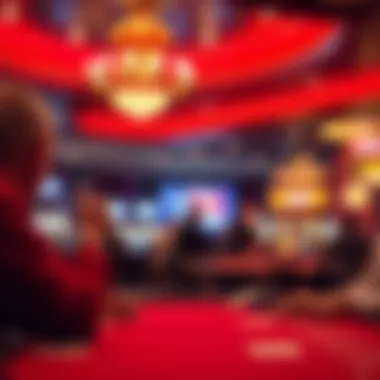Mastering the Art of Las Vegas Odds for Major Events


Intro
Las Vegas, often called the gambling capital of the world, holds a unique allure for both seasoned gamblers and curious onlookers. When it comes to major sporting events, particularly prestigious tournaments like the Masters, understanding the odds offered can mean the difference between a well-informed wager and a reckless toss of the dice. This article aims to unearth the layers that lie beneath the surface of Las Vegas odds, touching on how they are calculated and the various factors that influence them.
In the fast-paced world of betting, odds serve not just as numbers but as a lens through which the dynamics of competition are interpreted. For bettors, grasping these odds translates to better strategies, enabling them to place more calculated wagers. Additionally, players and teams, too, navigate the landscape shaped by these odds, often influencing their performance as the stakes rise.
By delving into the mechanics behind these odds, individuals can gain a clearer understanding of both the gambling culture that pulses through Las Vegas and the strategic approaches that savvy gamblers utilize to gain an edge.
Game Strategies
When it comes to navigating betting landscapes, adopting a smart game strategy is crucial. Learning how to effectively utilize game odds can elevate a gambler's experience from mere luck to informed decision-making.
Effective Betting Techniques
One cornerstone of successful betting hinges on understanding the different types of bets available. Familiarity with standard options such as moneyline wagers, point spreads, and over/under bets can significantly impact outcomes. Each betting type comes with its own odds and potential returns, hence knowing how to apply these can create a solid foundation for a bettor.
Some notable techniques include:
- Bankroll Management: Knowing how much to wager can prevent significant losses and prolong gambling enjoyment.
- Research: Staying updated on player performances, injuries, and weather conditions helps sharpen predictions.
- Line Shopping: Different bookmakers may offer varying odds on the same event, so comparing can yield better potential payouts.
Understanding Game Odds
Game odds aren't arbitrary; they are derived from a combination of historical data, expert opinions, and market trends. By comprehending how odds are set, gamblers can both analyze the rationale behind the offers and exploit inefficiencies in the market.
Odds typically reflect:
- Team Performance: Current form, statistics, and match-up history.
- Public Sentiment: The amount of betting action on a team affects the odds.
- Expert Insight: Bookmakers often factor in professional analysts' assessments to guide their odds.
By synthesizing information from these areas, gamblers can transform their betting approach into a calculated endeavor.
"Understanding how odds are formed allows you to make wagers that are more informed rather than relying solely on gut feelings or trends gleaned from social media."
Industry Trends
The gambling landscape is constantly evolving, influenced by advancements in technology and shifts in consumer behavior.
Latest Innovations in Gambling Technology
The rise of mobile betting apps is reshaping how gamblers interact with odds. Apps like DraftKings and FanDuel offer real-time data and easy access to place bets at a moment's notice. They often come equipped with features like live betting, allowing those inside the arena to wager as events unfold.
Upcoming Casino Game Releases
As casinos aim to attract new customers, they regularly unveil fresh gaming experiences. Acclaim for innovative poker variations and slot games with multi-tiered progressive jackpots can draw attention and new players eager for unique encounters.
Preface to Las Vegas Odds
Understanding Las Vegas odds is paramount for anyone who dabbles in the world of betting, especially when it comes to major sporting events like the Masters. These odds are not merely numbers; they reflect a multitude of factors that intertwine to shape expectations about the outcomes.
The essence of this section is to equip readers with knowledge about how these odds function, as this understanding can significantly influence the decisions bettors make. Whether you are a seasoned gambler or a casual enthusiast, comprehending how odds work is foundational. Therein lies the beauty of a well-calibrated betting system — it not only encapsulates statistical nuances but also mirrors the sentiments and behaviors surrounding an event.
Defining Odds in Gambling
Odds represent the probability of an event occurring versus not occurring. In simpler terms, they tell you how likely a certain outcome is and what your potential return could be if you place a successful wager. For instance, if the odds for a player winning a golf tournament are set at +200, placing a $100 bet would yield a $200 profit if that player triumphs.
However, odds can sometimes be misleading due to bias or market sentiments. Commonly, they are expressed in different formats like decimal, fractional, or American odds, each serving the same purpose but catering to various preferences.
- Decimal Odds: Often used in Europe, easily calculated by multiplying your stake by the odds.
- Fractional Odds: Common in the UK, showing potential profit relative to your bet.
- American Odds: Typically used by sportsbooks, indicating how much you would win on a $100 bet.
Overall, grasping the concept of odds allows bettors to make more informed choices, potentially leading to a more fulfilling engagement with the betting process.
The Significance of Las Vegas Odds
Las Vegas odds hold substantial significance in the realm of gambling. They are not just figureheads of the betting landscape; they serve as a guiding light for bettors striving to make sense of the sometimes chaotic world of sports gambling. The importance of these odds extends beyond individual bettors to affect the broader market as well.
For example:
- Market Sentiment: Odds can shift based on public betting trends or significant events, reflecting how the majority of gamblers feel about a matchup.
- Guide for Bookmakers: Bookmakers rely on odds as a means to stay competitive, adjusting them to manage their risk exposure effectively.
- Strategic Base for Bettors: Understanding these odds equips bettors with a critical awareness of when to place bets and how to maximize potential returns.
The Mechanics of Odds Calculation
Understanding how odds are calculated in Las Vegas is essential for any gambler looking to get an edge. This process is not just about putting numbers on paper; it is an intricate ballet of mathematics, statistics, and social elements. By grasping the mechanisms behind these odds, bettors can make more informed choices, shifting from a hit-or-miss approach to a strategic technique that can yield better outcomes over time.
Data Sources for Odds Setting
Creating odds isn't as simple as flipping a coin. Bookmakers use a variety of data sources to gauge potential outcomes for events, especially for major tournaments like the Masters. These data sets include:


- Current Player Rankings: Websites that track player metrics often inform odds. For instance, the Official World Golf Ranking provides crucial insights into your favorite golfer’s current standing and performance.
- Injury Reports: A player might be healthy one day and sidelined the next. Bookmakers pay close attention to the health of athletes because a famous player's absence can dramatically shift odds.
- Matchup History: Analyzing past encounters can provide context. If two players have met previously, the outcomes of those matches can inform likely future outcomes.
- Market Sentiment: Social media platforms, forums like Reddit, and betting exchanges can serve as indicators of public sentiment. If a celebrity golfer is trending, guesses on their performance can quickly influence odds, reflecting real-time betting behavior.
Legitimized sources heighten the reliability of odds, making the process not just an art, but a science.
Role of Historical Performance
Historical performance serves as a cornerstone in shaping the odds. This concept is not just for show; it actually lays the groundwork for predictions about future events. Several aspects come into play:
- Consistency: A golfer who performs well over several tournaments will likely have better odds. For example, a player like Tiger Woods, with a storied past, will attract certain odds compared to a newcomer.
- Performance in Similar Conditions: The Masters has unique course conditions, and examining how players have performed in similar environments can provide vital insights. A player accustomed to soft greens will fare better in similar conditions.
- Past Victories and Failures: The emotional toll of past performances can alter a player's mindset. A bettor might consider how winning or losing mentality affects a player's game. A big tournament win can either elevate or deflate confidence, thus impacting future outcomes.
Impact of Player Popularity
Though merit matters, popularity often plays an outsized role in determining odds. It's a phenomenon you can't ignore:
- Betting Volume: Players like Phil Mickelson may attract more bets, thus skewing the odds. If many bettors fancy a celebrity player, the odds will adjust in response. Bookmakers have to balance the books, which often means moving odds to minimize loss from heavily bet players.
- Media Coverage: Players hounded by the press may see their odds rise simply because they draw attention. This has implications for betting strategy; recognizing when odds shift due to hype, rather than performance, can present opportunities for astute gamblers.
- Fan Base Influences: Sometimes it’s all about who’s in fashion. If a golfer’s fanbase is roaring, their odds might not reflect their actual chance of winning. Knowing this can alert seasoned bettors to potentially inflated odds and could signal better chances elsewhere.
To summarize, comprehending how odds come to be is key to navigating the gambling landscape. A bettor with a sound grasp of data sources, historical performance, and the fickleness of popularity will likely find more opportunities to capitalize on mispriced odds, making their time at the sportsbook more productive than just a flutter.
Understanding the Masters: A Detailed Overview
Understanding the Masters tournament is essential for grasping how Las Vegas odds are set for one of golf's most prestigious events. The Masters isn't merely another tournament; it represents a unique confluence of history, skill, and passion that reverberates through the world of sports betting. This venerable event attracts not just players who have honed their skills over years but also fans and aficionados who are keenly aware of the nuances that influence the odds presented by bookmakers.
The significance of knowing about the Masters in the context of betting lies in numerous elements. For instance, each year, the outcome is affected by a host of variables, and bettors need this knowledge to wager wisely. Understanding these elements contributes to a deeper appreciation of the sport itself and enhances the betting experience.
Historical Context of the Masters
To appreciate the Masters truly, one must delve into its historical backdrop. Established in 1934, the Masters takes place at Augusta National Golf Club in Augusta, Georgia. Its long-standing traditions, such as the awarding of the iconic green jacket, infuse it with a sense of grandeur. The tournament has morphed into a rite of spring, drawing elite players and set against a backdrop of blooming azaleas and challenging course conditions.
For bettors, the history involves not just records and achievements; it influences how the odds are calculated. Trends from past tournaments—like how past winners often have shown consistent performances leading up to the event—play a significant role in shaping current odds. Bettors who recognize these underlying patterns can gain a clearer edge in their betting strategies.
The Masters isn't just about golf; it's steeped in stories of glory, heartbreak, and resilience. Understanding these narratives can enrich one’s betting insights and shape expectations for future event outcomes.
Key Players and Their Odds
The odds related to the Masters are shaped significantly by the players participating. Noteworthy names—such as Tiger Woods, Rory McIlroy, and Phil Mickelson—carry a weight that can sway the odds considerably. However, it's not solely about the big names. Emerging players or dark horses can also impact the betting landscape, often drawing attention as their odds fluctuate.
Assessing key players and their odds is paramount for bettors. Factors such as recent performances, injuries, and even psychological resilience play a role in the odds set by bookmakers. For instance, a player with a string of top finishes leading up to the Masters may see his odds lower compared to someone returning from a lengthy injury absence.
- Key Considerations for Bettors
- Performance history at Augusta: Familiarity with the course can be crucial.
- Recent form: Players that are 'hot' often carry an inflated status in odds.
- Betting sentiment: Public perception can drive odd alterations significantly.
"Understanding not just who the players are, but how they have performed historically provides crucial insight into betting decisions."
In summary, delving into the Masters and understanding its significance allows bettors to make informed decisions. The intersection of history, player dynamics, and solid betting strategies forms a robust foundation for analyzing Las Vegas odds related to one of the most celebrated golf tournaments in the world.
Factors Influencing Odds for the Masters
Understanding the various factors that influence odds for the Masters is crucial for anyone looking to place informed bets. From the conditions of the course to the psychological state of the players, each element plays a significant role in shaping how odds are set and adjusted. Recognizing these influences provides bettors with valuable insights that can inform their strategies, ultimately enhancing their chances of success in the competitive world of sports gambling.
Course Conditions and Alterations
The course where the Masters is held, Augusta National Golf Club, is known for its lush greens and challenging layouts. The state of the course can change drastically depending on various factors, particularly maintenance activities and renovations. For instance, if the greens have been altered—whether through aeration, overseeding, or other modifications—this can affect how the ball rolls and how players approach their shots.
When the course conditions are optimal, it sets the stage for lower scores, which can lead to adjustments in player odds. For example, if a particular player is known for excelling on fast greens but struggles on wet surfaces, their odds may shift dramatically based on the expected conditions during the tournament.
Factors that can influence course conditions include:
- Grass type: Different grasses react differently under various weather and watering conditions, impacting the speed and difficulty of the course.
- Rough Height: Taller rough can make shots around the greens harder, thus influencing a player’s comfort and odds.
- Bunker Maintenance: Bunkers can be a total game changer. Properly maintained sand can keep skilled players from losing strokes, altering their odds positively.
Weather Patterns During Tournaments
The weather is another dominant factor affecting betting odds in the Masters. Conditions such as wind, rain, and temperature can influence player performance significantly. For example, high winds may level the playing field between strong and weak players. If a player is accustomed to calm conditions, they might struggle in windy situations, causing their odds to reflect that risk.
In addition, sudden weather changes can prompt a scramble among bookmakers to adjust the odds. Bettors often look at forecasts leading up to the tournament, making bets on players they think will thrive in those conditions. Here’s how weather can influence betting decisions:
- Precipitation: Wet conditions may favor players with good short games, adjusting odds accordingly.
- Heat: Players who benefit from warm weather may see a shift in their odds if forecasts predict a scorcher.
- Cold: Cooler temperatures might affect player muscles and swings, influencing performance.
"Weather can play a pivotal role in determining the outcomes of major tournaments, drastically shifting the dynamics of betting odds."
Psychological Pressure on Players
The Masters carries a weight of tradition and reputation that can exert pressure on even the most seasoned players. The psychological dynamics of competition can be just as important as physical skills and conditions. A player’s mental state may heavily impact their performance, with pressure manifesting in various ways—from mistakes on the greens to poor shot accuracy. Bookmakers often account for these psychological factors when setting and adjusting odds.
For instance, a rookie playing in their first Masters may face a steep learning curve. This pressure can skew their performance, typically reflected in longer odds compared to established veterans. In some cases, a highly skilled athlete who has not performed well in past tournaments may find themselves burdened by the weight of former expectations.


Key psychological aspects influencing players include:
- Experience: Veteran players might handle pressure better than newcomers, often leading to shorter odds.
- Form: A player on a winning streak might find their self-belief helping them perform well, thus potentially improving their odds.
- Course History: Players who have shown consistent performance at Augusta might feel more at ease, pushing their odds downward.
The Role of Bookmakers
The bookmakers hold a pivotal position in the gambling ecosystem, especially in the vibrant arena of Las Vegas odds. They are not merely entities that determine numbers; they play a crucial role in shaping the landscape of sports betting, particularly during major events like the Masters. The weight of their expertise influences not just the odds available to bettors but also the entire betting culture surrounding sporting events.
Importance of Bookmakers
Understanding the function and influence of bookmakers provides a clearer picture of how betting works in practice. Bookmakers analyze a multitude of data points, consider public sentiment, and factor in both historical performances and current trends in player and team conditions. This arduous process adds to the credibility of the odds they provide, which can affect wagering volumes, profitability, and the nature of the betting market itself.
Moreover, bookmakers can be seen as the gatekeepers of gambling integrity. Their reputation hinges on offering fair odds and managing risks effectively. A sound reputation allows them to attract a larger clientele, while bookies known for skimming the edges may see their businesses dwindle as bettors look for more reputable options.
Market Analysis and Betting Behavior
In this realm, market analysis is paramount. Bookmakers observe an array of indicators—everything from player fitness, recent form, to the zeitgeist of public sentiment. Pay attention, because they practically run a crystal ball! They delve deep into betting behaviors, sometimes using algorithms and analytics to gauge where the money flows.
For instance, if a star player is injured or performs poorly, odds may shift rapidly to reflect this downturn. Conversely, if there’s a sudden swell of betting on an underdog, bookmakers might adjust their odds upward, anticipating a growing interest. The beauty of this dynamic interaction is that it allows bookmakers to hedge their risks while ensuring the betting market remains fluid and enticing.
Adjustments in Odds Over Time
Over the course of a tournament, odds can shift like the sands of the desert. Bookmakers constantly reevaluate their numbers based on new developments. For example, during the Masters, if a lesser-known player begins outperforming expectations, the odds can be drastically altered overnight. This leads to what can often seem like a roller coaster of odds, a crucial aspect that bettors must navigate when placing their wagers.
These adjustments are not whimsical; they stem from measured observation and statistical rigor. A last-minute information leak about a player’s recovery or a stormy forecast can sway public betting patterns and consequently, odds. These shifts reveal the volatile nature of betting and highlight the necessity for adaptive strategies on the part of both bookmakers and bettors alike.
Blockquote:
"In the world of betting, nothing is set in stone. The right information at the right time can mean the difference between a winning bet and a costly mistake."
Interestingly, these shifting odds also serve psychological functions for bettors. A dramatic surge in odds for a particular player could make them seem like a betting darling, prompting more people to place wagers in reflexive excitement. Thus, the role of bookmakers transcends mere number crunching; they lead the entire betting narrative that unfolds.
In summary, the intricate mechanics of how bookmakers set and adjust odds are central to comprehending the world of sports betting. Their decisions not only impact the financial landscape of gambling but also shape the narratives in sports culture. Understanding these nuances is invaluable for anyone looking to engage thoughtfully in the betting sphere, especially during major events.
Strategies for Bettors
When it comes to gambling, understanding odds is fundamental for any bettor. The right strategy can mean the difference between a pocketful of cash and a harsh lesson learned. In this section, we delve into effective strategies that not only enhance a bettor's chances of success but also provide a deeper understanding of the complex landscape of betting odds, especially in events like the Masters.
Value Betting and its Importance
Value betting stands as a cornerstone for serious bettors. This strategy revolves around identifying odds that seem misaligned with an event's actual probability. In simpler terms, if a bookie offers 5-to-1 odds on an underdog that you believe has a better chance of winning than those odds suggest, that’s a value bet.
The key here is discernment. Bettors must resist the urge to back favorites based solely on their notoriety. For instance, while a popular player may seem like a safe bet at the Masters, diving deeper into statistics and course history might reveal a less-known contender who offers better value. Taking the time to analyze performances can provide a major edge.
Consider these elements while evaluating value bets:
- Statistical Analysis: Rely on data and metrics rather than gut feelings.
- Competition Level: Be aware of how previous performances against similar opponents influence current odds.
- Market Movement: Watch how odds change leading up to the event; sudden shifts can signal insights from sharper bettors.
This strategy does require patience and analytical skills, but when executed correctly, it stands to reap substantial rewards. Betting isn’t just a game of chance, but rather an art that entails strategically navigating the odds.
Comparative Analysis of Odds
Bettors will greatly benefit from the practice of comparing odds across multiple sportsbooks. Not all bookmakers have the same perspectives on odds, which can result in discrepancies that savvy bettors can exploit.
The process is straightforward:
- Open Multiple Accounts: Enabling access to various sportsbooks can provide a wider landscape of odds.
- Monitor Changes: Odds can fluctuate rapidly based on market trends, so keeping a close eye on competing sites can ensure you take advantage of the most favorable rates.
- Understand the Odds: Familiarity with decimal, fractional, and moneyline odds can give clarity on which bets are worth taking.
For example, if one sportsbook places a player at +1500 while another lists them at +1000, this difference can translate to a significant payout. While it may seem trivial to discuss just a few extra points, over time, these discrepancies compound into substantial profit.
Remember: In the world of betting, every bit counts. Success comes from being informed, sharp, and persistent.
In summary, employing effective strategies like value betting and comparative analysis can transform betting from a simple gamble into a calculated investment. Staying disciplined and informed is crucial for maximizing returns and mitigating losses.
Analyzing Betting Trends
Analyzing betting trends is like peering through a looking glass into the gambling world, revealing patterns and shifts that can inform strategic betting decisions. For gamblers and casino enthusiasts, understanding these trends holds significant importance, as the ebb and flow of odds can provide insights that elevate a bettor's chances of realizing a profit. There’s no doubt that the deeper one digs into these trends, the better equipped one becomes to capitalize on favorable situations.
Betting trends can reveal how certain factors continuously influence the odds offered by bookmakers. By examining historical data and current market behaviors, bettors gain a clearer sense of where the smart money is going. This can be crucial, especially in high-stakes environments like the Masters, where even minute movements in odds can indicate sharp money or public sentiment around specific players.
Key elements to consider when analyzing betting trends include:
- Public vs. Sharper Money: Identifying whether trends are driven by casual bettors or more astute, seasoned gamblers can offer a strong tactical advantage.
- Volume of Bets: When a particular wager receives a flood of bets, it may cause the odds to shift, revealing where the excitement lies and which players are deemed likely to perform.
- Timing: Keeping track of when these trends occur can indicate a change in sentiment or player performance, allowable to gauge when it is best to place bets.
Understanding betting trends also aids in risk management. For example, if many bets are placed on a long-shot player, it might be wise to monitor that situation before committing any resources. Being aware of these trends might just arm a bettor with the knowledge needed to make informed decisions.
Historical Odds Trends for the Masters


When one talks about historical odds trends at the Masters, it's more than just numbers on a page. It's a story waiting to be told; a tapestry woven from years of data, player performances, and environmental conditions. Over the decades, the Masters has shown remarkable odds fluctuations influenced by past champions, emerging talents, and even the prestige associated with certain golfers.
Evaluating how odds have changed for particular players provides insight into their past successes or failures at Augusta. For instance, %Rory McIlroy% has undergone various odds recalibrations reflecting his performance consistency and public allure. When searching archival data, one might notice how pre-tournament odds for seasoned players generally remain steadfast, while younger competitors might experience larger swings based on their recent performances or even their general popularity.
Moreover, it's essential to take into account the broader context of any given year. Changes in the course conditions, such as alterations to hole placements or even weather patterns, can cause significant shifts in how odds are set against each player's history at the Masters.
Player Movements and Shifts in Odds
Tracking player movements and shifts in odds serves as a barometer for assessing bettors’ sentiments. These changes are not arbitrary; they're a product of multiple variables, such as championships leading up to the Masters or internal team changes. A player might receive skyrocketing odds right after a win at a leading tournament or following a stellar round of golf just weeks before the Masters.
This dynamic analysis also reflects evaluations of player form, fitness, and psychological readiness. For example, if %Jordan Spieth% is performing poorly leading into the tournament, one could expect a downtick in his odds. On the flip side, a strong finish in a major event right before the Masters could see his odds tighten significantly.
Additionally, personal stories or changes within a player's life might stir public interest, leading to an influx of bets. While these shifts may seem erratic, seasoned bettors know that they present unique opportunities to find value. For instance, if a popular player’s odds dramatically shift after they miss a cut in a previous tournament, it could be worth exploring whether that presents a solid wagering opportunity based on their capabilities.
Understanding such nuances in player movements can allow bettors to leverage insights to their advantage, spotting moments when the odds might not fully reflect a player's potential. Ultimately, analyzing trends in betting allows enthusiasts to build an informed strategy, leading the way to more calculated, and potentially, profitable decisions.
Legal and Regulatory Framework
In the bustling world of gambling, particularly in Las Vegas, understanding the legal and regulatory landscape forms the backbone of betting activities. Laws governing gambling not only protect the integrity of the games but also serve as a safety net for players, bookmakers, and the broader industry. These legal guidelines dictate how odds are set, the limits of betting, and the responsibilities of operators. This section will explore the essential elements surrounding gambling laws in Nevada and their implications on the odds landscape.
Gambling Laws in Nevada
Nevada's gambling laws are a patchwork of regulations designed to ensure fair play and responsible betting practices. At the heart of these regulations stands the Nevada Gaming Control Board. This body oversees all operational aspects of gambling, ensuring that everything from sports betting to casino activities is conducted lawfully and transparently.
Some key points about gambling laws in Nevada include:
- Licensing Requirements: All operators must obtain a license to offer gambling services. This involves rigorous background checks and compliance with established standards to weed out any unsavory elements.
- Age Restrictions: Players must be at least 21 years old to legally place bets. This age limit helps protect minors from the potential harms associated with gambling.
- Taxation and Revenue: Nevada imposes taxes on gambling revenues, which not only funds state services but also contributes to the marketing and maintenance of world-class facilities that attract millions of visitors annually.
Failure to adhere to these regulations can result in severe penalties, including hefty fines or even revocation of a gaming license. Thus, having a clear understanding of these laws is crucial for any gambler looking to engage with odds effectively.
Impact of Regulation on Odds
The legal framework surrounding gambling in Nevada significantly affects how odds are constructed and adjusted. Without a solid regulatory foundation, chaos can reign supreme in the betting market. Understanding how regulations impact odds offers insight into both the operational side of betting and the overall security felt by players.
Here’s how regulation might influence odds:
- Stability and Trust: Regulations give players confidence that the betting environment is safe and fair, leading to higher participation rates. More players typically mean a more competitive environment, which can affect how odds are set.
- Transparency: When regulations dictate how bookmakers must report odds, it ensures players are making informed decisions, knowing they have access to reliable information.
- Market Adjustments: Regulators may intervene in instances where odds appear to be skewed due to insider information or market manipulation. Such oversight protects the integrity of the betting environment, encouraging fair competition.
A well-regulated framework not only legitimizes the betting process but helps maintain a balanced odds ecosystem that rewards informed bettors.
Case Studies in Betting
When diving into the world of betting, case studies serve as invaluable snapshots, revealing the complexities and character of gambling that numerical odds simply cannot convey. They not only illustrate the consequences of specific betting decisions but also provide a platform to analyze underlying trends, players' behavior, and even market fluctuations. Exploring notable instances of betting, especially at events like the Masters, underscores the radical variances in outcomes brought about by fluctuating odds and unique player scenarios. This section will illuminate the multifaceted nature of betting through detailed case studies, drawing connections between real-life events and broader gambling theories.
Notable Betting Events at the Masters
The Masters Tournament, held annually at Augusta National Golf Club, is a goldmine for case studies in the realm of betting. Here are some events that stand out:
- Phil Mickelson's 2004 Victory: At the time, Mickelson had often been labeled as the best golfer never to win a major. His final-round surge and resultant victory not only stunned the spectators but redefined his odds for subsequent tournaments. Bettors who put their faith in Mickelson that year found themselves laughing all the way to the bank. His triumphant moment opened a floodgate of bets for more top finishes in future events.
- Jordan Spieth's 2016 Blow-Up: Spieth entered the final day with a commanding lead but experienced a costly meltdown, losing to Danny Willett. For those who had high-stakes bets on Spieth, this instance was a sobering lesson about the unpredictable nature of golf. Understandably, it led to a significant rethink of how bettors evaluated similar scenarios in the future.
- Tiger Woods' Return in 2019: After years of injuries and personal issues, Woods’ comeback win in 2019 was not only a testament to his perseverance but also created a stir in the betting community. Despite long odds due to doubts surrounding his fitness, many astute bettors took a gamble on Woods. Their risk paid off handsomely, underscoring how different narratives can influence odds and bettor sentiment.
These cases reveal more than just betting outcomes; they illustrate human psychology, resilience, and the unforeseen domino effect of betting decisions. By studying such landmark events, the bettor can recognize patterns and make informed choices in future endeavors.
Lessons Learned from Historical Bets
The tale does not end with notable events only; importantly, there are lessons gleaned that resonate with both seasoned and novice bettors.
- Risk vs. Reward: The most critical lesson is understanding the delicate balance between risk and potential rewards. High potentials often come with steep risks, a truth that seems to scream more loudly in instances like Spieth’s collapse.
- Market Sentiment Is King: Historical betting trends show that emotions can sway odds as much as player performance. The fervent belief in Woods caused his odds to tighten considerably, despite concerns over his physical condition.
- Adaptability Is Essential: The dynamic nature of betting requires an adaptable mindset. Strategies rooted in past performance may falter under new conditions, like unexpected weather or course changes, highlighting the need for real-time analysis.
- Data and Analysis Matter: Informal research is useful, but what separates successful bettors from others is a mix of qualitative analysis and statistical data. Instead of just relying on hearsay, effective betting is often based on thorough case studies and an understanding of betting trends.
Both historical betting events and their resulting lessons enrich a bettor's comprehension of the game, offering insights into the unpredictable world of gambling while preparing them for future wagers. In the fast-paced environment of betting, knowledge is indeed power, turning the specter of risk into informed strategy.
The Future of Betting Odds
The landscape of betting odds is not static; it's an evolving entity, influenced heavily by various factors, including technology and changing market dynamics. This section seeks to explore the paths that betting odds might take moving forward, emphasizing the significance of these changes for bettors and the gambling industry at large. As the competition between bookmakers heightens, understanding the direction in which betting odds are heading is vital for anyone looking to place informed wagers.
Technological Innovations
In the age of information, technological innovations have become the wind beneath the wings of the betting industry. The advent of data analytics, artificial intelligence, and machine learning are some of the key players reshaping the odds-making process. These advancements allow bookmakers to analyze vast amounts of information in real-time, from player performance statistics to weather conditions, enabling them to set more accurate odds.
- Data Analytics: With powerful tools at their disposal, bookmakers can track player performance and identify trends that might influence outcomes. This means bettors can expect more precise odds, as real-time data feeds become critical in shaping betting lines.
- Artificial Intelligence: Algorithms can now predict outcomes with unprecedented accuracy, eliminating much of the guesswork that was once commonplace. This technological leap helps in adjusting odds almost instantaneously, depending on how events unfold.
"The era of guesswork in odds-making has given way to a data-driven approach that offers insights like never before."
- Mobile Technology: The rise of betting apps has made it easier to place bets on the go. Bettors have instant access to odds adjustments as they watch games unfold on their devices, amplifying the betting experience and diversifying the types of bets available.
While these innovations present numerous benefits, they also lead to complications, such as the risk of bettors attempting to manipulate outcomes using insider information or advanced betting strategies. The net effect of these innovations will profoundly impact how odds are calculated and perceived.
Evolving Betting Markets
In tandem with technological strides, the betting markets themselves are witnessing notable shifts. E-commerce is altering how gambling operates, with online platforms making it possible for bettors anywhere in the world to engage with odds set in Las Vegas.
- Global Reach: The expansion of online betting services has opened a new frontier for bookmakers and bettors alike. Individuals in jurisdictions where gambling was previously restricted can now participate in betting, increasing the overall market size and competition.
- Changing Regulations: As legalization spreads across various states and countries, different regulatory frameworks are emerging. For example, in the U.S., states like New Jersey and Pennsylvania have paved the way for others to follow. Bookmakers must remain agile, adjusting their odds in response to varying legal environments, which adds layers of complexity to the odds-setting process.
- Market Competition: With more players entering the gambling arena, competition is fierce. Bookmakers are constantly recalibrating their odds in response to their rivals to attract bettors. This competitive landscape can lead to fluctuations in odds, as each bookmaker seeks to offer the most enticing options.







